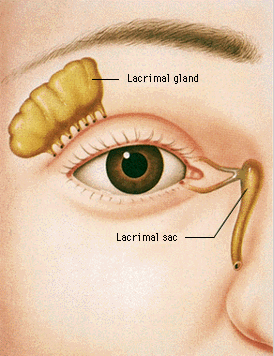As I wiped a tear from my eye, I asked myself, “Why?” This happens to so many of us. It just takes one moment of exhaustion, and suddenly I am almost crying – simply because I yawned. What is the link? How and why do human beings cry? And why are our tears salty?
 Basal tears – as in, the wet stuff on your eye – is made up of three layers: one watery layer of ‘lacrimal fluid’ between a layer of oil and layer of mucus. They’re produced in the lacrimal gland, which looks like a wonky eyebrow on a diagram. Blinking keeps the fluid evenly spread over the eyeball, and tubes at the inner corner of your eye suck old tears into the lacrimal sac by the same capillary action by which trees suck water up from the ground. After that, the tears flow into the nasal cavity and keep the insides of your nose moist and cosy. You know how your nose gets bunged up when you cry? That’s because the overload of tears in your eyes spills in to your nose as well as out onto your face. Your nose cries with your eyes.
Basal tears – as in, the wet stuff on your eye – is made up of three layers: one watery layer of ‘lacrimal fluid’ between a layer of oil and layer of mucus. They’re produced in the lacrimal gland, which looks like a wonky eyebrow on a diagram. Blinking keeps the fluid evenly spread over the eyeball, and tubes at the inner corner of your eye suck old tears into the lacrimal sac by the same capillary action by which trees suck water up from the ground. After that, the tears flow into the nasal cavity and keep the insides of your nose moist and cosy. You know how your nose gets bunged up when you cry? That’s because the overload of tears in your eyes spills in to your nose as well as out onto your face. Your nose cries with your eyes.
Lacrimal fluid contains – surprise, surprise – some salts, such as sodium and potassium. The salt content is very similar to that of blood plasma, actually. There are small quantities of some proteins and fats in there too. A particularly noteworthy component is lysozyme, which breaks down the outer walls of bacteria. Even more interesting is the difference between reflex tears – the ones that leak out when you cut an onion, or when a fly collides with your eyeball – and emotional tears. The latter contain greater amounts of three hormones with scientific-sounding names: prolactin, adrenocorticotropic hormone and leucine enkephalin.
These three hormones are produced when the body is under stress. This has lead some people to conjecture that tears are a way of excreting these hormones when levels get too high, which would explain why ‘letting it all out’ with a good cry makes you feel better. But it’s not the only explanation. Others have studied the physical effects of crying – including raised heart rate and sweating – and noted that the calming effects, such as slowed breathing, last longer than the unpleasant parts. The body ends up physically calmer. And yet, of course, it could just be social conditioning that makes us believe that crying can be good; or it could be the empathy from others who can see the emotional tears.
That’s the why; here’s the how. There are a few things going on in the brain when the waterworks turn on, especially in the limbic system. The limbic system is the evolutionary primitive centre of our brain, which covers many things: appetites for sex and food, homeostasis, memories, hormones and some senses. It also plays a role in emotions, and that’s what we’re interested in. The limbic system plays with emotions related to survival (one could say, fight-or-flight emotions) such as fear and anger. Crying – whether in frustration or in sorrow – stimulates a similar response. Those things I mentioned before, raised heart rate and sweating and so on, are the effects.
Another effect is that the glottis (the region of the windpipe where the vocal chords are) expands to allow maximum inflow of air for fighting or flighting. However, once the brain twigs that there is no fight-or-flight situation, it attempts to reboot the digestion process, which it had shut down in a surge of stress. But part of digestion is swallowing, which requires the glottis to close so that food doesn’t slither into the lungs. Yet the continued act of crying stimulates the glottis to open. Conflict, aargh. The result? That tragic ‘lump-in-the-throat’ feeling.
Obviously, none of this happened when I yawned. I wasn’t emotionally aggrieved by my sleepiness. (If I was, I wouldn’t tell you anyway.) The reason we may weep a little after a yawn or a sneeze or a huge guffaw is quite simple: the facial contortions put pressure on the lacrimal sac and reduces the volume of tears it can hold, thus causing a pile-up of tears on the eyeball. And that’s the reason why tiredness made me cry.